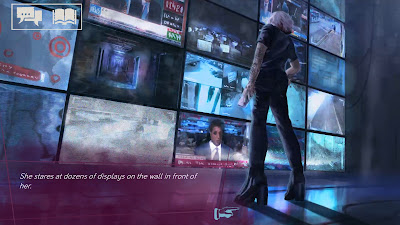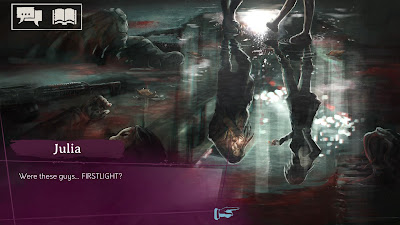After conquering the massive and delicious beast that was Wrath Of The Righteous, I turned my sights to a significantly smaller quarry: Vampire: The Masquerade: Shadows of New York. This is a sequel to Coteries of New York, which I played last year and enjoyed.
Visually, the two games are very similar, with a classic visual novel style. Almost all of the characters are vampires, and thus have a significant gothy vibe. The settings are cool: all the locations are in New York City, but instead of the major tourist locations we mostly stick to run-down industrial districts, overgrown community parks or quiet residential streets. The visuals in Shadows are stylistically similar but more impressive, particularly with subtle animations and lighting. Characters are static but seem to "breathe" with faint fluctuations. You'll sometimes see a pedestrian jogging by in the background, or a flickering police siren, or the flash of lightning over the Brooklyn Bridge. These add a lot of life to the atmosphere.
MINI SPOILERS
Gamewise, though, Shadows is pretty different from Coteries. Shadows is a very straight visual novel. You can occasionally choose which of two or three locations you will visit on a given night; these locations can sometimes provide a bit of background lore or insight, but they're mostly just flavor. You are playing as a predefined character, Julia, who speaks almost all of her lines unprompted. Occasionally you can choose between one of three dialogue responses. These have a minor impact on NPC's opinions of you and can influence their future dialogue. At five points during the game, you need to choose between two options. Sometimes this is a course of action, but more often it's just deciding how you feel about something. These five choices collectively determine which of two endings you will receive for the game.
Overall, it's much less game-y than Coteries was. You can't choose between different player characters, you always have access to the same Powers, you don't need to worry at all about your Hunger level, feeding is just a stylistic choice, using your Powers doesn't have any consequences, your side-missions are all standalone vignettes instead of an evolving plot, NPCs don't really track their opinion of you.
MEGA SPOILERS
The irony is, though, that Coteries has a lot of game systems that don't actually mean anything in the end: it doesn't matter what you do, the story always ends in the same way. Shadows has almost no game systems, but it does allow you to influence the outcome, albeit in an oblique way.
Somewhat amusingly, the Steam achievements for the two endings are labeled "Good Ending" and "Bad Ending", although they arguably should be reversed. The "Bad" ending is the one where you hold on to what remains of your humanity, make up with your girlfriend, and strike out west for a life of freedom. The "Good" ending sees you mercilessly pursue power and achieve your putative goal at great cost.
So, which is better, Shadows or Coteries? I enjoyed Coteries more while playing it, but after finishing both I think I give the edge to Shadows. I'm a huge sucker for player agency, and having at least the possibility of a lighter ending made the whole experience feel fun.
As for the actual plot: It was pretty enjoyable. There are a lot of callbacks to Coteries, which I mostly enjoyed, though if I hadn't played the game somewhat recently much of it may have gone over my head. The plot felt both more sprawling and more focused than in Coteries. Sprawling in that all of the side-quests were pure flavor and didn't tie in to the main plot at all, unlike Coteries where the side-quests determined who was in your coterie and would accompany you at the end. But it's more focused in that you learn relatively on what the main point of the game is ("Find out who killed Boss Callihan and why"), unlike Coteries which felt like "You're a vampire, now go do vampire things and see what happens."
The tone of the game felt very different from any other V:TM game I've played. Apparently this is due to the protagonist being a member of the Lasombra clan, which I haven't encountered; that, in turn, seems to be due to some recent meta-plot development, which have moved the Lasombra out of the Sabat and into the Camarilla fold. Anyways, it was a little startling to learn that the PC has a mortal girlfriend (not a ghoul!) who knows that the PC is a vampire and is cool with it. But, it's explained well in-game as being due to the Clan's hatred of slavery. In general, Julia seems to be much more in touch with her previous mortal life than other V:TM characters, and she regularly bumps into old friends and colleagues without it being a big deal.
I don't generally prefer predefined characters in games, but Julia had a great voice and was a lot of fun. She's cynical and sarcastic, but her cynicism is fueled by a strong sense of justice and a belief that the world could be better than it is. She's also bright and well-read, with references ranging from Bulgakov to meme culture. While still a gloomy game, there's a lot of good humor sprinkled throughout, thanks mostly to Julia's perspective on events.
END SPOILERS
I'm not a big expert on White Wolf lore, but am learning more all the time. About 99% of my information comes from video games, and 1% from going down wiki rabbit holes while looking up stuff from the video games.
As I've mentioned before, I do really appreciate how Paradox is handling the World Of Darkness property. It's a bummer that V:TM:B2 has been canceled, but that hasn't held up the trickle of lower-price-point games like these. It all helps with the worldbuilding and keeping the scene vibrant. I really appreciate games like these as palette cleansers between the often daunting RPGs that I can't seem to stop playing.









No comments:
Post a Comment